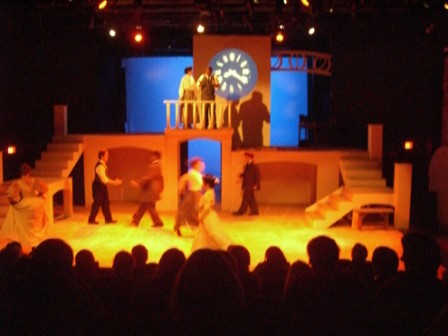

Einstein's Dream
Clock Productions
Clock Productions
Highly Recommended - Chicago Sun Times
Highly Recommended - Chicago Sun Times
"Imagine a scene of daily life in a typical European city (Bern, Switzerland, for example), circa 1905.
 |
 |
 |
 |
 |

11/7/05 - 12/18/05
Thu-Sat 8p, Sun 3p
"In a world without memory, everyone carries giant books to record the details of their lives so they can be discovered fresh later on. Another world finds its residents stuck in time, each of them fixated on a moment in the past and unable to move on. The next world is blessed with two kinds of time, mechanical and body. Both have their adherents, each baffled by those who subscribe to the other kind of time, and yet both are true. The 1993 novel by MIT professor Lightman, from which Acerra and Arnold adapted their passable production, is made up of many such meditations on time, loosely structured around the young Albert Einstein preparing to publish his papers on special relativity. Yet Einstein is a minor character a point of access and Lightman's conjectures on the possible natures of time are whimsical fables about human nature and psychology. Acerra and Arnold's episodic adaptation enlists the citizens of 1905 Bern, Switzerland, to narrate their own portrayals of Lightman's tales, with Einstein occasionally watching with bemusement as the characters swirl around him. The whole thing doesn't accomplish much, but the show's young ensemble members are striking in their ability to create a cohesive whole from their competing styles and spirits. The most successful scenes, such as the dinner party in a world where time moves forward slowly and without event, come together with a metronomic precision" - Kris Vire, TimeOut Chicago 12/8/05
" Alan Lightman's precious, largely banal 1993 best seller makes for precious, largely banal theater. Snapshots of imagined worlds where time operates unconventionally--sometimes flowing back and forth, sometimes stopping, sometimes sticking here or there--are supposed to represent Einstein's fantasies while developing his special theory of relativity in 1905. But most are too pedestrian or logically inconsistent to have seduced the unconscious of a great genius. Directors Dawn Arnold and Patrizia L. Acerra remount their 2000 show, this time for Clock Productions and Moving Dock Theatre Company, and coax subtler, more convincing performances from the new cast, who are captivating when they do something besides simply act out the narrated text. Too often, though, the staging is as unimaginative as the book" - Justin Hayford, Chicago Reader 11/23/05
"Time does not behave itself in the manner in which we have become accustomed in Einstein’s Dreams, currently in production at Chopin Theatre, 1543 W. Division St. Produced by Clock Productions in association with The Moving Dock Theatre Company, the performance consists of a series of scenes, set in the Swiss village of Bern in 1905, that bring to life the science-induced fever dreams of the young Albert Einstein, who lived in Bern while he worked on his now-famous theories of relativity. Co-directors and co-adapters Patrizia Acerra and Dawn Arnold have created Einstein’s Dreams in response to the best-selling 1993 novel of the same name, written by Alan Lightman. Those who are fascinated by discussions of the physics of time should not miss this show. Others may wish that Clock Productions had spent its rich resources of design, performance and directing skills on material that reached deeper into what makes humans tick. The possibilities of an existence in which time is not an absolute are intriguing. Perhaps time stops, every now and then, just for a thousandth of a second or so. No one would really notice, but the infinitesimal gap could be enough for the flicker of an idea to enter someone’s mind and change the course of the future. Perhaps time exists on three levels at once, as space does. Any given moment in a life would, then, play out to three different conclusions, simultaneously and in different realities.On an elegant, classically designed set of staircases and archways, an ensemble of eight young, attractive performers waltz through their paces as turn-of-the-last-century Swiss villagers, illustrating scenes in which time bends, stops and stutters. Courting, picnicking, and chatting on the street, the characters move with pristine precision through choreography that is as charmingly exact as a Swiss clock, and?unfortunately?not much more emotionally engaging. Acerra’s and Arnold’s work is most effective when it exploits strong visual or aural images to bring their "what-if"s into focus. In a scene where the villagers wake up each morning with no memory of their past lives, each performer carries a big book that glows with a light from within. As the narrator describes their lives to us, the characters are reading their own histories, punctuating the narrative with gentle exclamations of surprise and delight. An inexorable metronome dominates another scene, in which two couples at dinner move and speak in strict time, which gives a pleasing rhythm to their behavior while pointing out its utter vapidity.Moving and speaking with confident, though self-conscious, grace, the actors all appear to be in their early twenties?a homogeneity of age that unintentionally flattens out a dramatic exploration of time. Carol Blanchard created the charming period costumes in a monochromatic color scheme of ivories and grays that evokes a past that has faded away. Tamora Wilson pours lush lighting onto the terrific set by David Denman. David DeLaFuente created the sound score, which dovetails seamlessly with the text and movement.Reflections on time as our prison-keeper, our god, our constant companion or a mischievous trickster are interesting to consider but difficult to take personally. Like dried flowers that crumble when they?re touched, this beautiful, expertly realized production ultimately feels brittle and distant" - Kristin Gehring, Chicago Journal 11/05
Author
Alan Lightman
Director
Patrizia Acerra, Dawn Arnold
Performers
David Bakken, Daniel Behrendt, Tony Bozzuto, Christine Castro, Shannon Clausen, Pearon Hampton, Jolene Turner, Helen Young
Production
Tamora Wilson, Carol Blanchard, David Delafuentes, Aaron Beck, Jessica Pribble, Hilary Martin, David Denman


